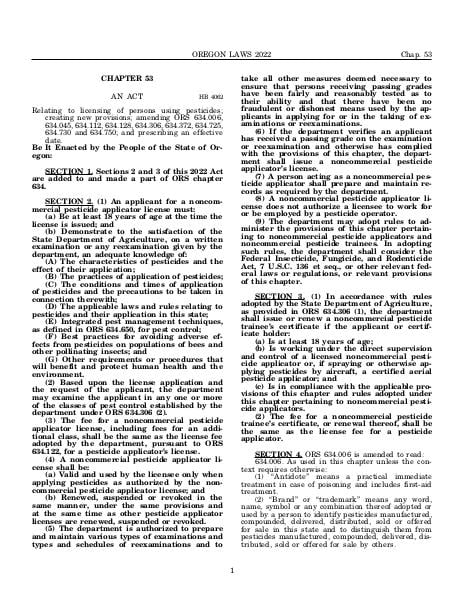ORS 634.045
Avoidance of adverse effects on pollinating insects
(1)
Intentionally left blank —Ed.(a)
Oregon State University, in consultation with the State Department of Agriculture, shall develop educational materials regarding the best practices for avoiding adverse effects from pesticides on populations of bees and other pollinating insects.(b)
The educational materials must include, but need not be limited to, measures that pesticide applicators and pesticide trainees can take to protect honeybees and bumblebees.(c)
The university and the department shall design the requirements to ensure that any pesticide applicator applying or supervising the application of a pesticide is knowledgeable regarding alternatives to, the appropriateness of, and precautions for pesticide use that may be injurious to the health of bees and other pollinating insects.(d)
The department shall make the educational materials described in this section a part of the education required for taking the pesticide applicator licensing examination under ORS 634.122 (Applicator license).(2)
Intentionally left blank —Ed.(a)
Oregon State University, in consultation with the State Department of Agriculture, the State Forestry Department, the Department of Transportation and the State Department of Fish and Wildlife shall develop and annually revise a pollinator health outreach and education plan to educate the public regarding the best practices for increasing habitat for bees and other pollinating insects and avoiding adverse effects from pesticides on populations of bees and other pollinating insects. The plan shall include:(A)
Educational materials that are appropriate and effective for a broad audience, including, but not limited to, pesticide applicators, consultants, dealers, operators and trainees and private applicators, as those terms are defined in ORS 634.006 (Definitions), and members of the public; and(B)
A communication strategy for dissemination of educational materials using media sources, state agencies, associations and organizations.(b)
Oregon State University, including a representative of the university who specializes in pollinator health, the State Department of Agriculture, the State Forestry Department, the Department of Transportation and the State Department of Fish and Wildlife shall conduct an annual meeting to:(A)
Confer regarding the activities that the university and each agency undertook to promote pollinator health and increases in pollinator habitat in accordance with the plan developed under paragraph (a) of this subsection; and(B)
Review revisions to the plan developed under paragraph (a) of this subsection.(3)
The State Department of Agriculture shall develop a bee incident reporting system to facilitate public reporting of incidents related to pollinator health to the department.(4)
Oregon State University, in consultation with the State Department of Agriculture, shall develop a pesticide use safety plan to educate the public regarding best practices in the use of pesticides. The plan shall include:(a)
Educational materials that are appropriate and effective for a broad audience, including, but not limited to, pesticide applicators, consultants, dealers, operators and trainees and private applicators, as those terms are defined in ORS 634.006 (Definitions), and members of the public; and(b)
A communication strategy for dissemination of educational materials using media sources, state agencies, associations and organizations. [2014 c.40 §1; 2015 c.744 §1; 2021 c.29 §1]
Source:
Section 634.045 — Avoidance of adverse effects on pollinating insects, https://www.oregonlegislature.gov/bills_laws/ors/ors634.html.
